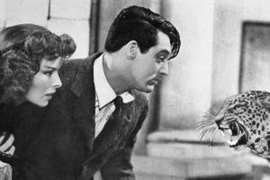The challenge of the rom-com

The romantic comedy takes place between the meet (usually "cute") and the happily ever after. In between, the movie's job is to get us rooting for the couple while it comes up with entertaining ways to keep them apart long enough for us to finish our popcorn and well enough that we feel that they've earned that happy ending. Two traditional rom-com set-ups are immediate conflict (Bringing Up Baby, where a character summarizes the meta-theme of romantic comedies: "The love impulse in men frequently reveals itself in terms of conflict.") and what I call the "boy who cried wolf" theme, where someone tells a lie and gets deeper and deeper, afraid to tell the truth to the trusting soul he/she now adores. The first catgory ("African Queen," "My Fair Lady," "It Happened One Night," "Moonstruck," "When Harry Met Sally") depicts the sparks and the chemistry while the second ("Some Like it Hot," "Roman Holiday," "Guys and Dolls") is a metaphor for the conflicts we feel as we reach for intimacy and authenticity but resist the vulnerability. In dramas, we often see the barriers of family ("West Side Story," "Slpendor in the Grass") or history ("Casablanca"). But romantic comedies are usually about overcoming initial dislike or becoming more honest.
Two pre-Valentine's Day romantic comedies show how difficult it is these days to find some believable reason for keeping apart two people who are obviously (from the opening credits if for no other reason) meant to be together at the end of the movie. "Something New" is something old -- a very traditional "how will I know my love" plot with just one 21st century twist. The heroine is a black woman who is uncomfortable with the idea of a white boyfriend. (There is some reference to her wanting a professional man, but he is an architect even though he digs in the mud, so the real reason is race.) He is impossibly perfect, endlessly devoted and undemanding, which makes this more of a chick flick than a date movie. But Sanaa Lathan's performance has us rooting for her all the way.
The other movie is "Imagine Me & You" and its trendy twist is that the heroine leaves the man she thought she loved for the female florist who decorated her wedding. But the real departure is not the gender of the loved one -- it is the violation of the "almost" rule of comedy. Brides are supposed to run away just before the "I now pronounce." In this film, she goes through with it, one of several reasons that keep it from achieving the spirit of lightness and possibility that are essential for any romantic comedy, no matter what the gender of the couple.




1 comment:
That's an interesting point about "rom-coms" Nell. I never thought of it before, but I can't think of a single example that doesn't fall into your two categories. PS-- that's a great picture from Bringing Up Baby. I'd like to see more pictures on your blog.
Post a Comment